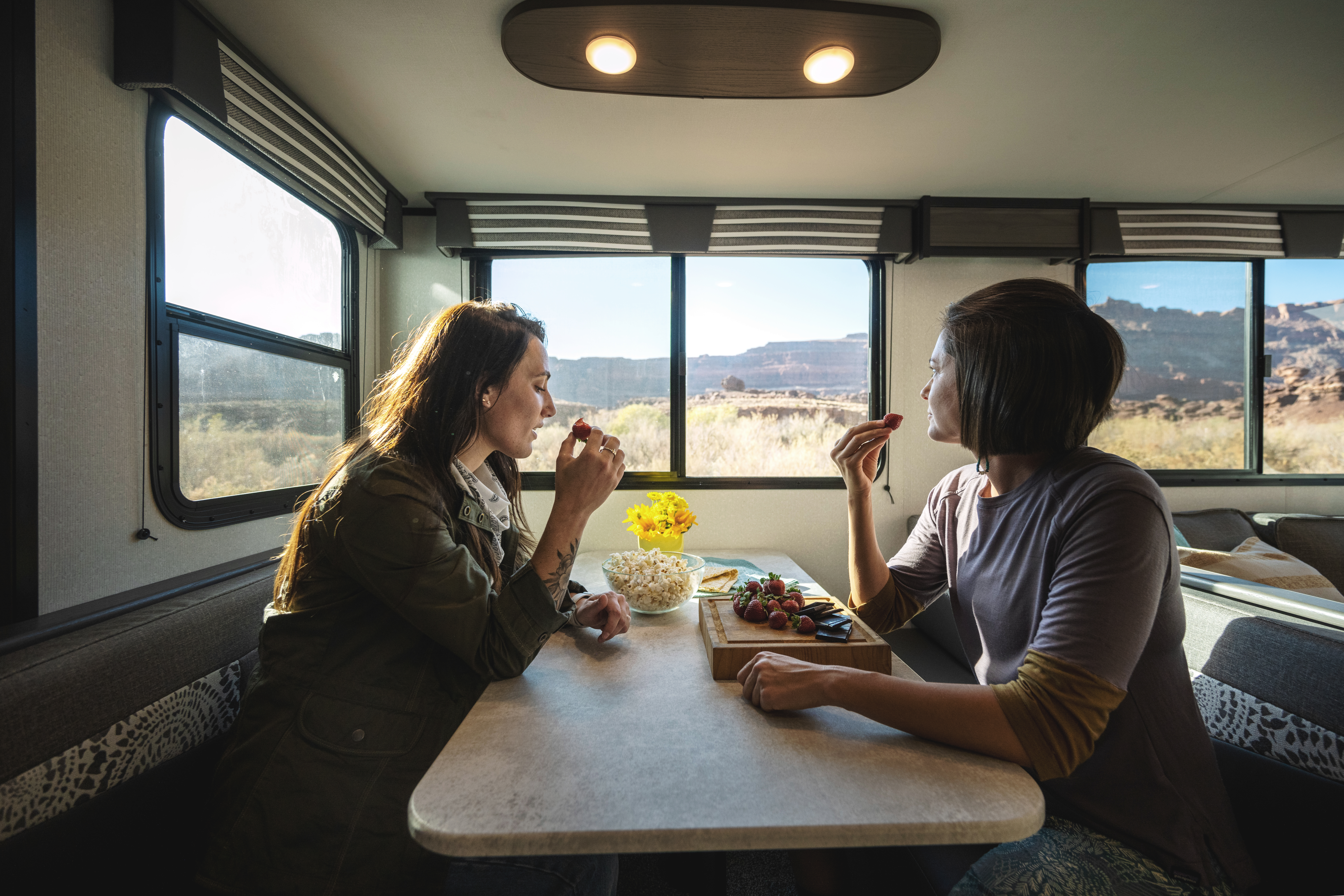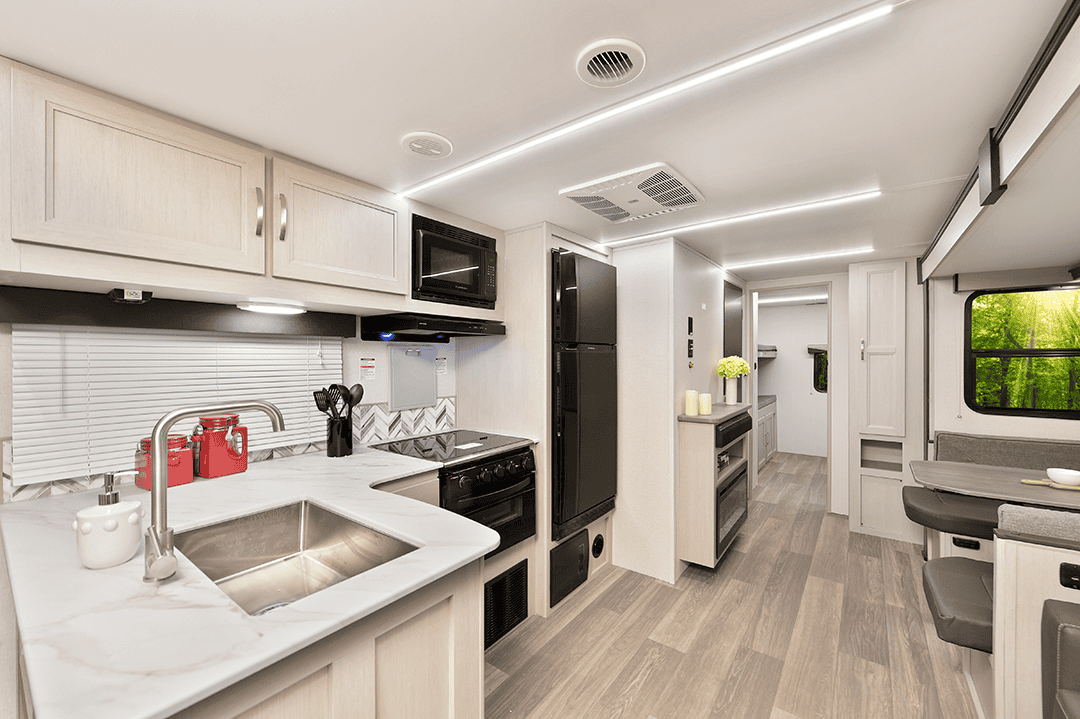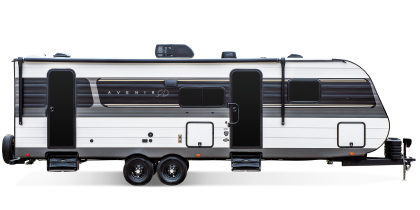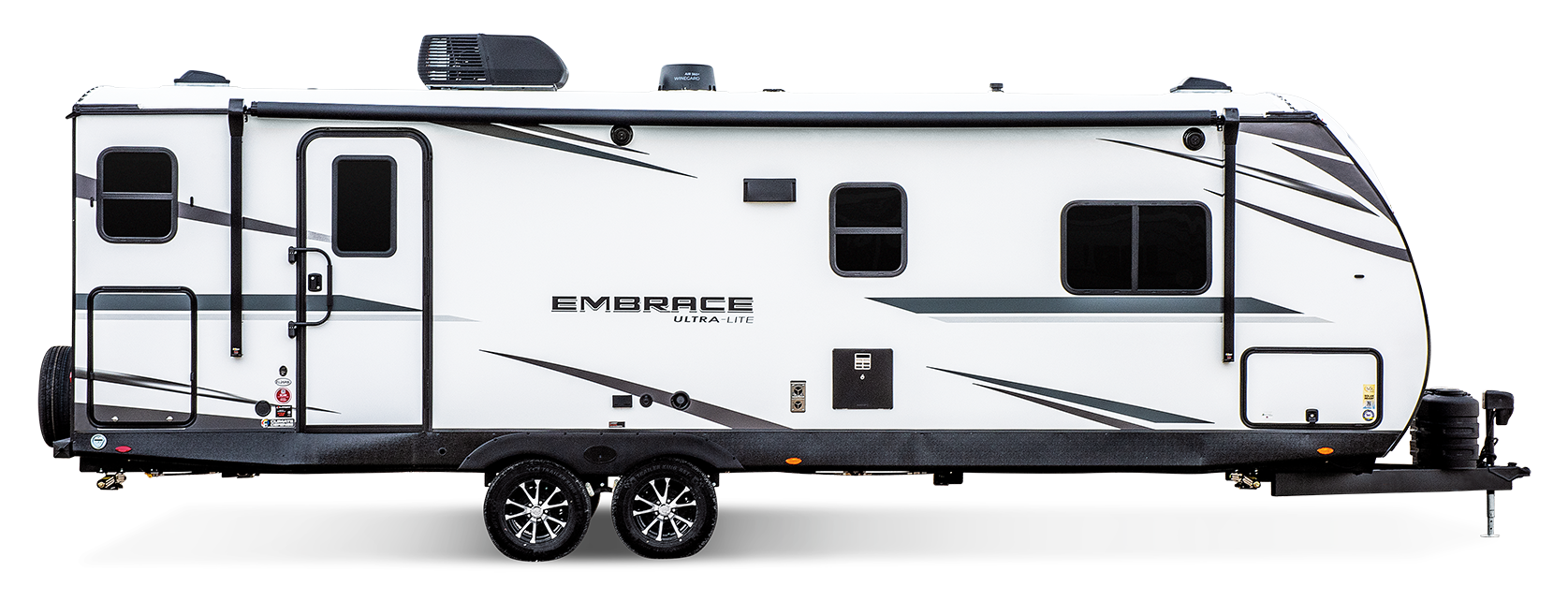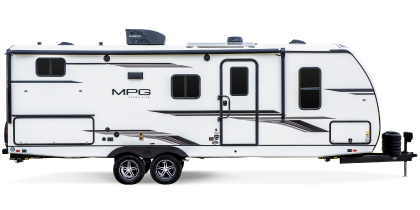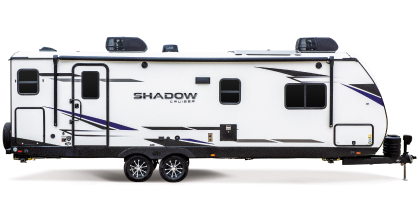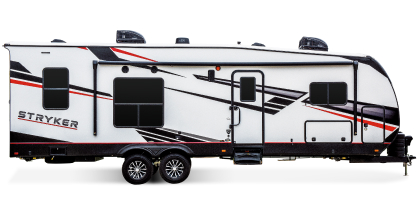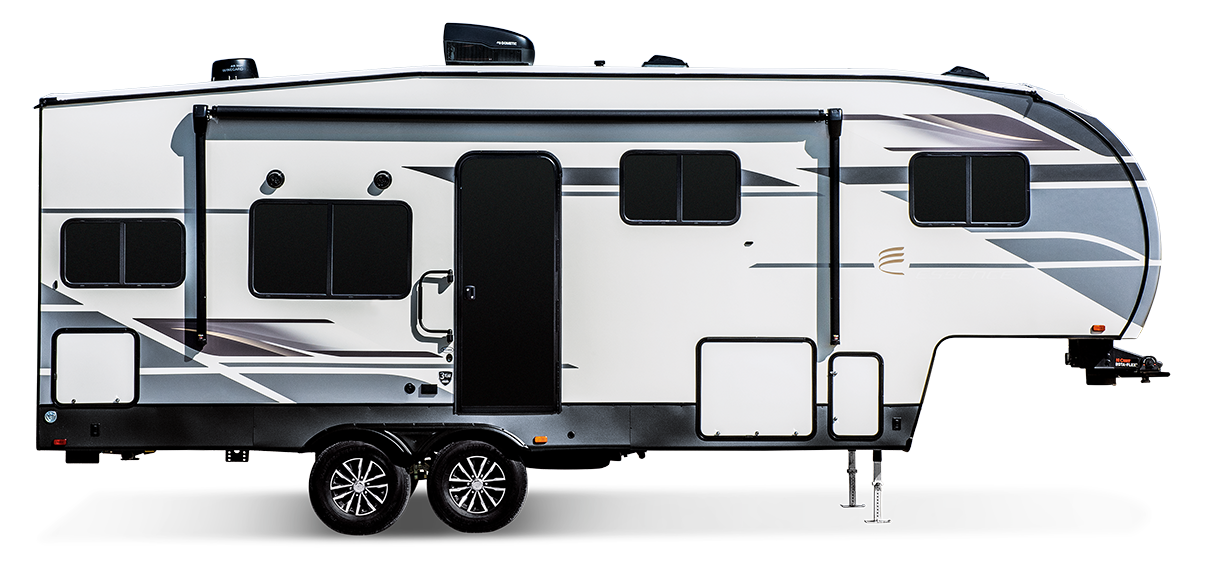Now that you’re up to speed (pun intended) on the basics of how to research and buy an RV, let’s get into some of the finer points. These are details that will help you choose between similar models and include the kind of things that can make your camping dreams a reality. Here is your guide to researching and buying your first RV, part 2.
WEATHER AND WILDLIFE
WEATHER
One thing I hear from a lot of people who haven’t done much RVing is some version of, “Well, I don’t need a big RV because I will be outside most of the time.” And that may very well be true, but there are a few points to consider as you research and buy your first RV.
Most people who use RVs for camping like the outdoors. But the outdoors doesn’t always cooperate. Depending on what climate you’re in, there may be days that are too hot, too cold, too wet or just too stormy to spend most of the day outdoors.
A few summers back, we were camping in Estes Park, Colorado, and it rained for a week straight. On another trip, we headed down to Texas, where temperatures peaked at 105 degrees for several days in a row. Weather can absolutely drive you indoors.
PLANNING FOR THE LEAST FUN DAY
So if you’re traveling with other people or creatures, including friends, children or pets, take a moment to consider how it would feel to spend all day in the RV with them due to weather conditions. Did your blood pressure rise at the prospect? Then you may want to consider staying away from smaller RVs and looking for something with a little room to spread out.
On the other hand, if you’re traveling solo or with a laid back partner, you may feel perfectly content to spend a day in close quarters together, waiting for a storm to pass. Just don’t plan to research and buy an RV sized for the best case scenario––plan for the bad weather, moody tempers and the exhaustion that comes after a long hike, and you’ll be fine.
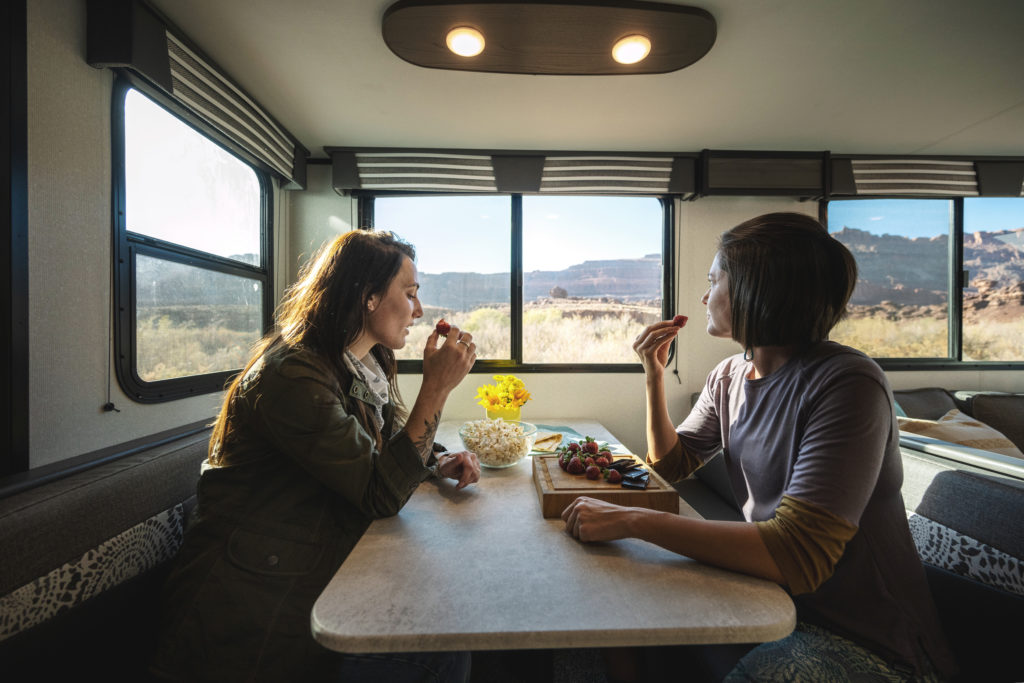
WEATHER RATINGS
In addition, some campers are simply not rated for specific kinds of weather–commonly extreme cold. If you’re hoping to buy an RV and head for the ski slopes, you’ll want to research and buy something that’s specifically designed and built to withstand the cold. This typically includes things like cold-weather upgraded walls and windows, heated holding tanks, insulated pipes, a more robust fireplace, etc.
If you plan to camp in the cold, look for RVs listed with an “Arctic Package,” and make sure you consult with a dealer and the manufacturer about the cold-weather capability of any model you’re researching. If you buy a used RV or rent an RV for a test trip, consult with the RV’s owner’s manual before camping in cold weather to make sure it’s been properly insulated and tested against frigid conditions.*
WILDLIFE
Another factor that can drive you back into the RV is the animal kingdom. In some parts of the country, bugs can be an overwhelming nuisance at various parts of the year. Nobody loves sitting in the middle of a mosquito swarm, for instance, or fighting off a crowd of horse flies.
And on the bigger end, one time we were camping in Colorado Springs and a few black bears decided to take a stroll through the campground. While it happens way less often than swings in weather, wildlife can keep you cooped up for unknown periods of time. So size your RV accordingly.
SLIDES
What are slides? They’re the part of some RVs that extend out when they’re parked to give the interior more space. They can expand automatically, with the push of a button, or manually, with cranks. Common spaces that include slides are the dinette, living area and bedroom of an RV. While it’s more typical to have one to two slides, some fifth wheels can have five or more.
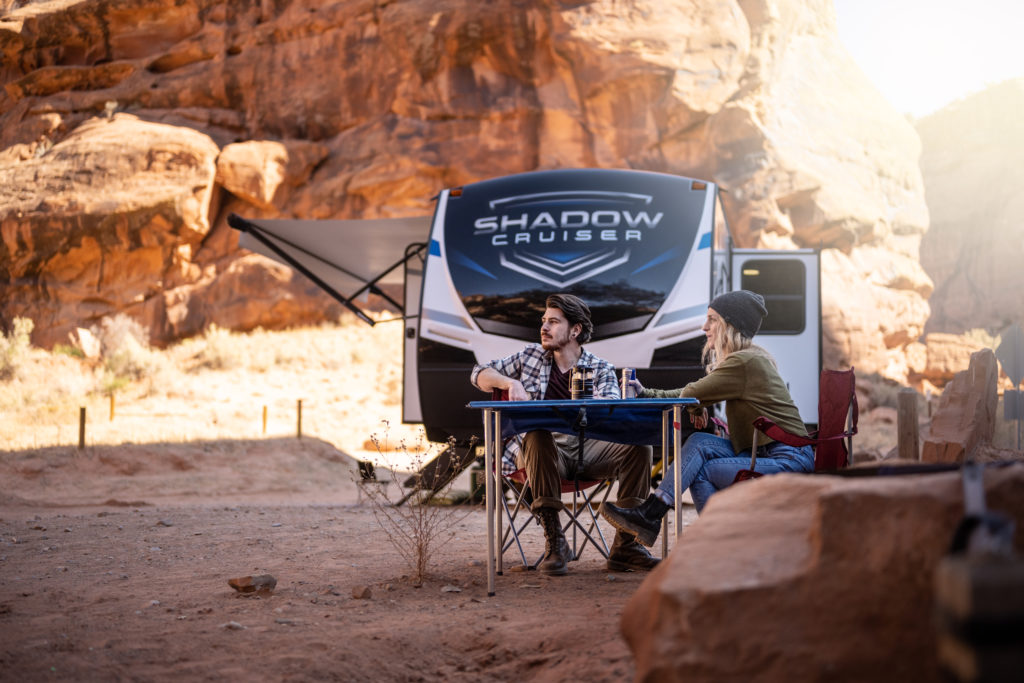
Slides can be an easy way to add space to an RV without adding length, but they do come with some complexities. For example, they add weight to the RV, which may impact which vehicle you can use to tow. They have slide motors and weather sealing that needs to be maintained to stay fully optimized. And if you’re not scrupulous about sweeping before you retract slides, debris can get caught in the slides and cause damage.
However, for us personally, the additional space outweighs any of the potential downsides or extra work needed to keep slides in good working order.
STORAGE
People travel and camp in all different kinds of ways. What one person considers “traveling light,” might be more equipment and cargo than another person had ever needed. For instance, if you’re a full-time RVer, you’re into outdoor sports that use equipment or you’re traveling with a crowd, storage space becomes important. If you’re a minimalist, child-free or don’t need any specialty sports equipment, storage may be less of a concern.
Longer trips have a way of using a lot of storage space. If you don’t have a washer and dryer onboard, you may pack more clothes to get between laundry days. Or you might just prefer to bring along your own creature comforts, like nice camp chairs, your own fire pit, a big cooler or two, etc.
One thing I will say is that I’ve never regretted having a little more storage than I needed, but we’re on the road a lot and your mileage may vary. As you research and buy your RV, think carefully about your storage needs and err on the side of a little more than you need.
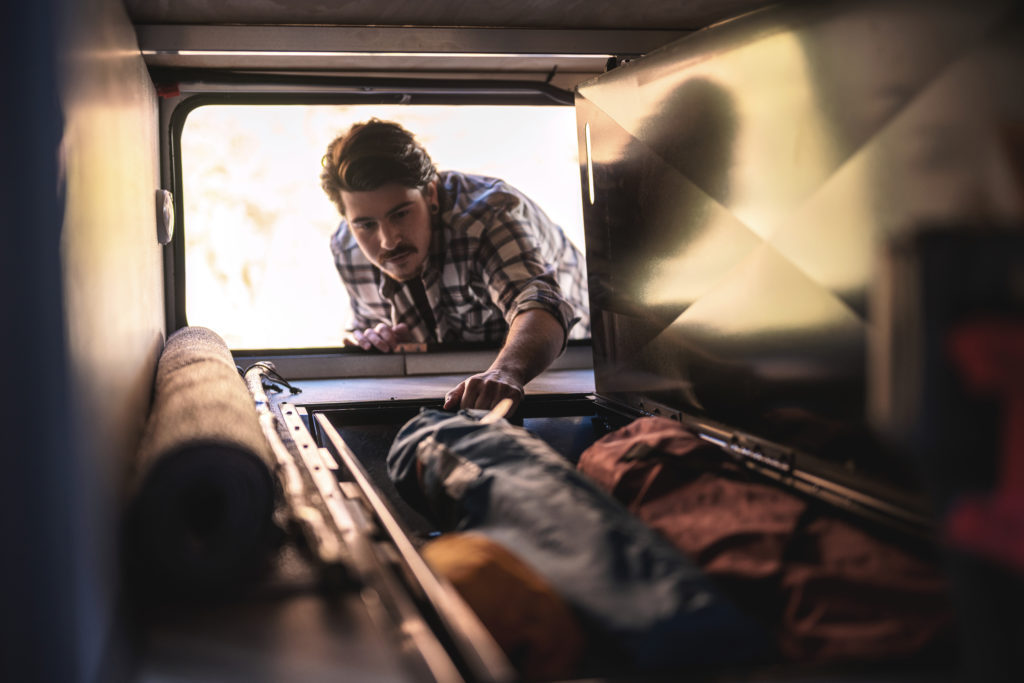
AMENITIES & APPLIANCES
Two more subjects that can help you narrow down your choice of RVs are amenities and appliances. They’re often intertwined––a lot of amenities are appliances, and vice versa. As you get ready to research and buy an RV, think about which amenities fit your life best.
Some common amenities/appliances include:
- Full-size, residential refrigerators
- Ovens and microwaves
- Outdoor kitchens
- Flat screen TVs (indoor and outdoor options)
- Electric fireplaces
- Full-size bathrooms (some even have a tub)
- Multiple bathrooms
- Washer/dryer prep
AMENITIES
Amenities are what can take an RV experience to the next level. For instance, some toy haulers have a secondary half bath in the garage space with a wall that can fold up when you need the extra space to load a golf cart or side by side. Full-size refrigerators can be really handy for RV owners with big families full of growing kids, or people with particular food requirements, like vegans, vegetarians and people with food allergies. And who doesn’t love sitting inside by the fire on a rainy night?
APPLIANCES
Obviously, the more appliances you have, the more energy and power they will draw from your electric and gas hookups. If you’re the kind of person who only camps at campsites with full hookups, that’s great, you can stop reading and just skip ahead to the next section. But if you’re the kind of person who foresees spending time off-grid, whether that’s because you love boondocking or because you don’t mind spending the night in a restaurant parking lot, keep reading.
All appliances are powered either through electricity, propane, or a combination of both. For instance, your RV furnace will run on propane and your electric fireplace can heat your space through electricity. Different types of refrigerators can run on either gas or electric, and running the tap will require the use of a water pump that runs on electricity.
So if you spend any kind of time off-grid, you’ll also want to take into account how much power and energy your RV can store or create to help run itself.
ALTERNATE POWER SOURCES
There are plenty of ways to bank or create your own energy on the road. Some people install solar panels, which can be a great source of power if you’re in a climate that’s consistently sunny. (Less so on overcast days or months.) You can also look into having additional batteries in your RV to bank power for when you need it. And finally, generators can be a great resource if you’re the kind of person who absolutely loves unplugging from shore power and the world at large.
Many RVs have onboard generators already, but if not, you can always add an external generator. (But never run an external generator indoors; there’s a risk of carbon monoxide poisoning.) Because external generators tend to be louder than onboard generators, they’re often prohibited during quiet hours in campgrounds, so don’t count on them to keep the heat or AC running overnight if you’re in close quarters with other people.
We hope the information above helps you shop a little easier for your first RV. With so many amazing models on the market, there’s truly an RV out there to suit everyone’s life. Our RV Finder can help you find your perfect match. Have you tried it yet?
*Disclaimer: RV model and floor plan features and winterization needs may vary. Not all RVs are equipped with cold weather packages. Please review your RV owner’s manual and consult with your dealer and/or the manufacturer to confirm whether your RV is suitable for intended travel conditions and whether your RV warranty will be impacted by use in various weather conditions.
This article was written by Rich & Irina Plakas.
